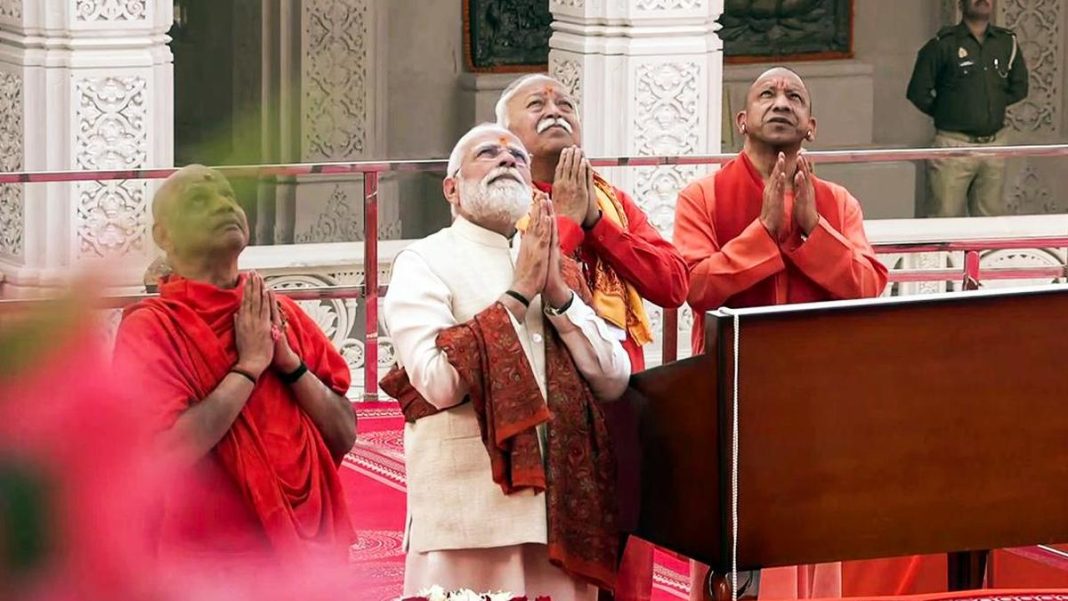The recent flag-raising ceremony at the Ayodhya Ram Temple, a moment of profound cultural and religious significance for millions in India, drew immediate and critical remarks from Pakistan. However, New Delhi swiftly and unequivocally rejected Islamabad’s commentary, with India’s Ministry of External Affairs (MEA) dismissing the remarks with “contempt.” This sharp diplomatic exchange underscores the deep-seated friction and differing interpretations of historical, legal, and cultural events that continue to define relations between the two South Asian neighbours.
For India, the construction and associated ceremonies at Ayodhya are entirely internal matters, stemming from a sovereign judicial process. Pakistan’s attempt to internationalise or politicise such events is consistently met with a firm refusal to engage, reiterating India’s stance against any interference in its domestic affairs.
Pakistan’s Provocation and India’s Unwavering Rebuttal
Following reports of the flag-raising ceremony at the under-construction Ram Temple in Ayodhya, Pakistan’s Foreign Office spokesperson issued a statement condemning the event. Islamabad typically characterises such developments as an “attempt to alter the status of the disputed site” and expresses concerns about regional peace and stability, often linking them to the situation of minorities in India. Pakistan’s remarks often disregard the legal resolution of the Ayodhya dispute within India’s constitutional framework.
India’s response was swift and definitive. The MEA spokesperson articulated New Delhi’s position with characteristic clarity, stating that Pakistan has absolutely no locus standi on India’s internal matters. The term “contempt” used by India signifies a complete and utter disregard for Pakistan’s comments, deeming them baseless, malicious, and an unwarranted intrusion into India’s sovereignty. The MEA emphasised that the entire process, including the construction of the Ram Temple, is a direct outcome of a lawful and sovereign judicial process culminating in the landmark Supreme Court verdict of 2019.
This firm rebuttal reinforces India’s long-held position that Ayodhya is a purely domestic issue, resolved by its highest court, and not subject to external scrutiny or condemnation. The diplomatic exchange highlights India’s resolve to protect its internal affairs from any foreign intervention, especially from a nation with whom its relations remain largely adversarial.
The Ayodhya Context: A Matter of Sovereignty and Justice
The Ayodhya Ram Temple holds immense religious and cultural significance for a vast section of the Hindu population in India and globally. Its construction is proceeding on a site whose ownership was definitively settled by the Indian Supreme Court in November 2019. The verdict, which allocated the disputed land to the Hindu parties for the construction of a temple, was a culmination of a decades-long legal battle, marking a significant moment in India’s socio-political history.
For India, the flag-raising ceremony and the ongoing construction are not merely religious events but also symbolise the nation’s adherence to the rule of law and the peaceful resolution of complex historical disputes through its robust judicial system. Any attempt by an external party, particularly Pakistan, to question this process is seen as an affront to India’s sovereignty and its democratic institutions.
An MEA spokesperson reiterated India’s position, stating, “Pakistan’s unsolicited remarks betray a fundamental misunderstanding of India’s constitutional ethos and the sanctity of our judicial processes. Ayodhya remains an internal matter, and any attempt to internationalise it is rejected unequivocally.” This statement underscores India’s insistence on its right to manage its own cultural heritage and legal outcomes without external interference, particularly from a nation that India frequently accuses of supporting cross-border terrorism.
Underlying Bilateral Tensions and Geopolitical Implications
This diplomatic spat over Ayodhya is not an isolated incident but rather a recurring symptom of the deep-seated mistrust and unresolved issues that characterise India-Pakistan relations. Pakistan frequently attempts to comment on India’s internal affairs, particularly those concerning religious minorities or the administrative status of Jammu & Kashmir. India, in turn, consistently repels such attempts, maintaining that discussions should focus on core bilateral issues, notably cross-border terrorism, which India views as state-sponsored policy emanating from Pakistan.
The Ayodhya issue, therefore, becomes another flashpoint, illustrating the profound ideological and political differences between the two nations. India’s firm rejection of Pakistan’s remarks also serves as a broader message about its non-tolerance for any form of interference in matters it considers domestic. It reinforces India’s commitment to safeguarding its national interests and its sovereign right to determine its own path, free from external pressures or ill-informed commentary.
In conclusion, India’s emphatic rejection of Pakistan’s remarks on the Ayodhya Ram Temple flag-raising ceremony with “contempt” underscores New Delhi’s steadfast commitment to its sovereignty. It reiterates that the Ram Temple issue is an internal matter, resolved legally and constitutionally, and of deep cultural significance to India. The incident further highlights the challenging nature of India-Pakistan ties and India’s unwavering resolve to protect its national interests and internal processes against any form of unwarranted external interference.
—




